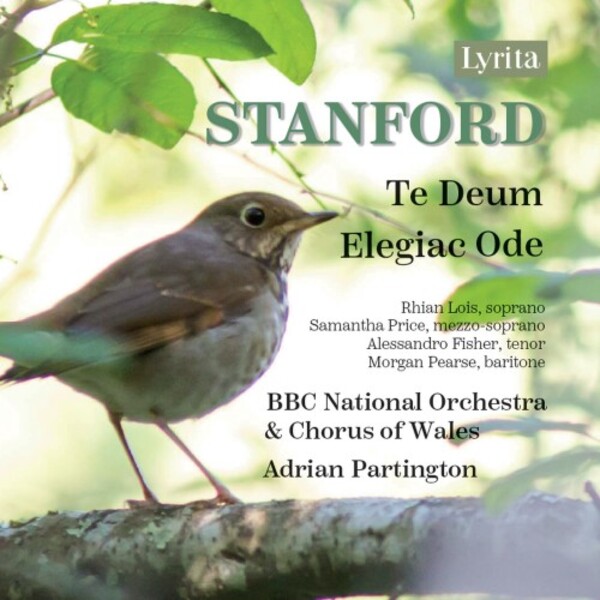STANFORD Te Deum. Elegiac Ode
View record and artist detailsRecord and Artist Details
Genre:
Vocal
Label: Lyrita
Magazine Review Date: AW2024
Media Format: CD or Download
Media Runtime: 73
Mastering:
DDD
Catalogue Number: SRCD435

Tracks:
| Composition | Artist Credit |
|---|---|
| Te Deum Laudamus |
Charles Villiers Stanford, Composer
Adrian Partington, Conductor Alessandro Fisher, Tenor BBC National Chorus of Wales BBC National Orchestra of Wales Morgan Pearse, Baritone Rhian Lois, Soprano Samantha Price, Mezzo soprano |
| Elegiac Ode |
Charles Villiers Stanford, Composer
Adrian Partington, Conductor BBC National Chorus of Wales BBC National Orchestra of Wales Morgan Pearse, Baritone Rhian Lois, Soprano |
Author: Andrew Achenbach
Completed in January 1897 to mark Queen Victoria’s Diamond Jubilee and first given at the following year’s Leeds Festival, Stanford’s imposing Te Deum can boast some strikingly confident and technically challenging choral writing – testament to the formidable skill and stamina of the 350-strong Leeds chorus (try the thrusting third movement, ‘Judex crederis’). There’s also a pleasing sense of harmonic adventure in the frequent juxtaposition of three adjacent tonalities (namely B flat, B and C), while the linked last two movements in particular attain a bracing momentum, the solo soprano’s top B flat at the final appearance of the words ‘In te speravi!’ thrilling in its cumulative impact. Like Stanford’s large-scale Requiem (which was recently so eloquently revived by Martyn Brabbins – Hyperion, 6/23), this is a work of arresting dramatic, emotional and architectural scope, and is splendidly served here by Adrian Partington and his expertly drilled forces. Full-bodied, realistically balanced sound, too, with the organ adding a most agreeable heft to any more opulent tuttis.
Partington and assembled company likewise impart dedicated and lucid advocacy to the Elegiac Ode, a setting of the burial hymn that concludes Walt Whitman’s poem When lilacs last in the dooryard bloom’d, written in response to President Lincoln’s assassination in 1865 – and which, as annotator Jeremy Dibble reminds us, was also employed by Holst (one of Stanford’s pupils at the RCM) in his Ode to Death (1919). Commissioned by the 1884 Norwich and Norfolk Festival, the work incorporates material sketched some three years previously. Lasting some 27 minutes in total, the four movements play without a break. The 32-year-old composer’s symphonic aspirations are clear – as, for that matter, is the influence of both Brahms and Wagner (whose Rhinemaidens surface in the third movement, ‘From me to thee glad serenades’, for soprano solo and female chorus).
Another typically courageous release from Lyrita, this, and definitely worth checking out.
Discover the world's largest classical music catalogue with Presto Music.

Gramophone Digital Club
- Digital Edition
- Digital Archive
- Reviews Database
- Full website access
From £8.75 / month
Subscribe
Gramophone Full Club
- Print Edition
- Digital Edition
- Digital Archive
- Reviews Database
- Full website access
From £11.00 / month
Subscribe
If you are a library, university or other organisation that would be interested in an institutional subscription to Gramophone please click here for further information.




